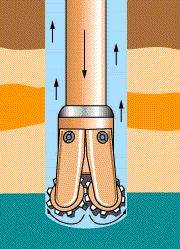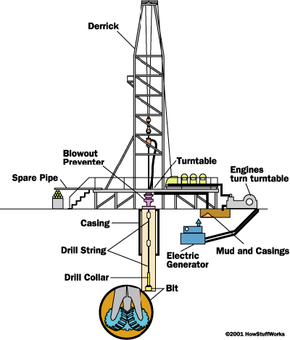Oil Rig Systems
Once the equipment is at the site, the crew sets the rig up. Here are the major systems of a land oil rig:
Power system
- large diesel engines - burn diesel-fuel oil to provide the main source of power
- electrical generators - powered by the diesel engines to provide electrical power
Mechanical system - driven by electric motors
Advertisement
- hoisting system - used for lifting heavy loads; consists of a mechanical winch (drawworks) with a large steel cable spool, a block-and-tackle pulley and a receiving storage reel for the cable
- turntable - part of the drilling apparatus
Rotating equipment - used for rotary drilling
- swivel - large handle that holds the weight of the drill string; allows the string to rotate and makes a pressure-tight seal on the hole
- kelly - four- or six-sided pipe that transfers rotary motion to the turntable and drill string
- turntable or rotary table - drives the rotating motion using power from electric motors
- drill string - consists of drill pipe (connected sections of about 30 feet (10 meters) and drill collars (larger diameter, heavier pipe that fits around the drill pipe and places weight on the drill bit)
- drill bit(s) - end of the drill that actually cuts up the rock; comes in many shapes and materials (tungsten carbide steel, diamond) that are specialized for various drilling tasks and rock formations
Casing - large-diameter concrete pipe that lines the drill hole, prevents the hole from collapsing, and allows drilling mud to circulate

Circulation system - pumps drilling mud (mixture of water, clay, weighting material and chemicals, used to lift rock cuttings from the drill bit to the surface) under pressure through the kelly, rotary table, drill pipes and drill collars
- pump - sucks mud from the mud pits and pumps it to the drilling apparatus
- pipes and hoses - connects pump to drilling apparatus
- mud-return line - returns mud from the hole
- shale shaker - shaker/sieve that separates rock cuttings from the mud
- shale slide - conveys cuttings to the reserve pit
- reserve pit - collects rock cuttings separated from the mud
- mud pits - where drilling mud is mixed and recycled
- mud-mixing hopper - where new mud is mixed and then sent to the mud pits
Derrick - support structure that holds the drilling apparatus; tall enough to allow new sections of drill pipe to be added to the drilling apparatus as drilling progresses
Blowout preventer - high-pressure valves (located under the land rig or on the sea floor) that seal the high-pressure drill lines and relieve pressure when necessary to prevent a blowout (uncontrolled gush of gas or oil to the surface, often associated with fire)
